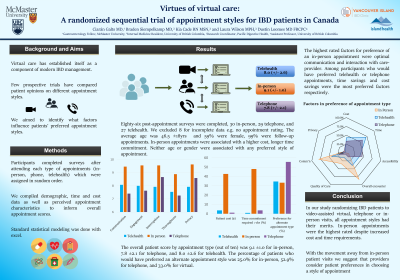Sunday Poster Session
Category: IBD
P0779 - Virtues of Virtual Care: A Randomized Sequential Trial of Appointment Styles for IBD Patients in Canada
Sunday, October 22, 2023
3:30 PM - 7:00 PM PT
Location: Exhibit Hall

Has Audio
- CG
Ciaran Galts, MD
McMaster University
Hamilton, BC, Canada
Presenting Author(s)
Ciaran Galts, MD1, Dustin Loomes, MD2, Kia Cade, RN2, Braden Siempelkamp, MD3, Laura Wilson, RN2
1McMaster University, Hamilton, BC, Canada; 2Pacific Digestive Health, Victoria, BC, Canada; 3University of British Columbia, Victoria, BC, Canada
Introduction: COVID-19 spurred a dramatic shift from in-person patient visits toward virtual care. To date, there are no prospective studies randomizing patients to different styles of appointment and assessing their perspectives on the type of visit. We aimed to identify preferred styles of appointments across various patient factors to inform decisions regarding the optimal appointment style for patients.
Methods: We randomized Inflammatory Bowel Disease (IBD) patients’ follow-up appointments to either in-person, video-assisted virtual, or via telephone and subsequent appointments to the alternate style of visit in a single-centre study in British Columbia, Canada. Participants completed surveys after each appointment style to minimize bias. We collected anthropometric data on participants and analyzed average scores assessing for potential associations. We used standard regression analyses and T-scores for assessment of statistical significance.
Results: Eighty-six post-appointment surveys were completed, 30 in-person, 29 telephone, and 27 telehealth. We excluded 8 for incomplete data e.g. no appointment rating. The average age was 46.5 ±18yrs and 59% were female, 99% were follow-up appointments. The overall patient score by appointment type (out of ten) was 9.1 ±1.0 for in-person, 7.8 ±2.1 for telephone, and 8.0 ±2.6 for telehealth. The percentage of patients who would have preferred an alternate appointment style was 25.0% for in-person, 52.9% for telephone, and 33.0% for virtual. The highest rated factors for preference of an in-person appointment were optimal communication and interaction with care-provider (86.4%). Among participants who would have preferred telehealth appointments 62.5%, and 37.5% cited time savings and cost savings as reasons respectively, and 60.0% for the same reasons for telephone based appointments. In-person appointments were associated with a higher cost, longer time commitment. Neither age or gender were associated with any preferred style of appointment.
Discussion: In our study randomizing IBD patients to video-assisted virtual, telephone or in-person visits it is clear that all appointment styles have their merits. Despite the increased cost and time commitment, there was a trend toward preference of in-person appointments though there was no statistically significant difference. With the movement away from in-person patient visits we suggest than providers should consider patient preferences in choosing a style of appointment.

Disclosures:
Ciaran Galts, MD1, Dustin Loomes, MD2, Kia Cade, RN2, Braden Siempelkamp, MD3, Laura Wilson, RN2. P0779 - Virtues of Virtual Care: A Randomized Sequential Trial of Appointment Styles for IBD Patients in Canada, ACG 2023 Annual Scientific Meeting Abstracts. Vancouver, BC, Canada: American College of Gastroenterology.
1McMaster University, Hamilton, BC, Canada; 2Pacific Digestive Health, Victoria, BC, Canada; 3University of British Columbia, Victoria, BC, Canada
Introduction: COVID-19 spurred a dramatic shift from in-person patient visits toward virtual care. To date, there are no prospective studies randomizing patients to different styles of appointment and assessing their perspectives on the type of visit. We aimed to identify preferred styles of appointments across various patient factors to inform decisions regarding the optimal appointment style for patients.
Methods: We randomized Inflammatory Bowel Disease (IBD) patients’ follow-up appointments to either in-person, video-assisted virtual, or via telephone and subsequent appointments to the alternate style of visit in a single-centre study in British Columbia, Canada. Participants completed surveys after each appointment style to minimize bias. We collected anthropometric data on participants and analyzed average scores assessing for potential associations. We used standard regression analyses and T-scores for assessment of statistical significance.
Results: Eighty-six post-appointment surveys were completed, 30 in-person, 29 telephone, and 27 telehealth. We excluded 8 for incomplete data e.g. no appointment rating. The average age was 46.5 ±18yrs and 59% were female, 99% were follow-up appointments. The overall patient score by appointment type (out of ten) was 9.1 ±1.0 for in-person, 7.8 ±2.1 for telephone, and 8.0 ±2.6 for telehealth. The percentage of patients who would have preferred an alternate appointment style was 25.0% for in-person, 52.9% for telephone, and 33.0% for virtual. The highest rated factors for preference of an in-person appointment were optimal communication and interaction with care-provider (86.4%). Among participants who would have preferred telehealth appointments 62.5%, and 37.5% cited time savings and cost savings as reasons respectively, and 60.0% for the same reasons for telephone based appointments. In-person appointments were associated with a higher cost, longer time commitment. Neither age or gender were associated with any preferred style of appointment.
Discussion: In our study randomizing IBD patients to video-assisted virtual, telephone or in-person visits it is clear that all appointment styles have their merits. Despite the increased cost and time commitment, there was a trend toward preference of in-person appointments though there was no statistically significant difference. With the movement away from in-person patient visits we suggest than providers should consider patient preferences in choosing a style of appointment.

Figure: Figure 1. Patient scores across various appointment features by style of appointment
Disclosures:
Ciaran Galts indicated no relevant financial relationships.
Dustin Loomes indicated no relevant financial relationships.
Kia Cade indicated no relevant financial relationships.
Braden Siempelkamp indicated no relevant financial relationships.
Laura Wilson indicated no relevant financial relationships.
Ciaran Galts, MD1, Dustin Loomes, MD2, Kia Cade, RN2, Braden Siempelkamp, MD3, Laura Wilson, RN2. P0779 - Virtues of Virtual Care: A Randomized Sequential Trial of Appointment Styles for IBD Patients in Canada, ACG 2023 Annual Scientific Meeting Abstracts. Vancouver, BC, Canada: American College of Gastroenterology.
